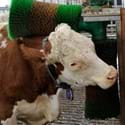Located high in the Miesbacher Alpine region of Upper Bavaria, the extensive Leitner Farm covers over 200 hectares divided roughly between forest and pasture, where a herd of 36 Simmental dairy cows and young stock graze.
Farmer Kajetan Leitner has been quick to embrace new technology to help with the management of his dairy unit, including investment in new animal housing and dairy facilities, as well as taking advantage of diversification opportunities that have helped to ensure the farm’s sustainability.
Kajetan Leitner has been a valuable and influential McDonald’s Flagship Farmer since 2011 and was a beef provider into our supply chain until early 2021. Although a change in our supplier infrastructure means he is not currently providing beef to McDonald’s, Mr. Leitner continues to incorporate sustainability practices and principles on his farm. We are currently identifying a new beef producer to represent Germany in the Flagship Farmers program.
Key areas of sustainable practice
Leitner is a member of the QS scheme, an independently audited and certified quality assurance program, which covers areas ranging from animal welfare to environmental requirements. QS status assures farm production methods, which in turn improves consumer confidence and the marketability of beef produced by the farm.
The farm uses a dual-purpose dairy breed (Simmental), with average milk yields of 7,800 liters and extending to four lactations (with the aim of increasing this to eight). Excellent prices are also paid for cull cows and bull calves, due to the Simmental’s good growth rates and high carcass meat yields.
All cows are fitted with a neck transponder, which measures their movement and activity level. This system provides an 80–90% accuracy in heat detection rates. Additionally, noticing a decrease in a cow’s normal activity level can help in early detection of injury or illness.
The farm also uses a handheld device to record treatments and daily management activities. This information is then uploaded to the farm’s main computer.
The full herd has access to pastures during the summer grazing period, which helps reduce summer feed costs.
The farm also has four apartments available, providing a total of 20 beds for tourists visiting the Alpine region and generating additional income for the business.
An automated milking system (AMS) frees the family from the time-consuming task of the daily milking routine, a valuable saving for a small farm. The AMS releases half a labor unit for every 70 cows being milked. This system also allows the cows to choose when they are milked, which reduces stress.
Cows need to lie down for between 10 and 14 hours per day and the farm’s free access stalls are fitted with rubber matting covered in straw to provide a comfortable lying area. Healthy cows are also more productive and increased cow longevity improves the farm’s economics.
Cows perform grooming as part of their natural behavior and the farm has fitted automated brushes in all areas where animals are housed; the frequency with which the cows use the brushes shows they provide a valuable benefit in reducing stress within the herd.
The farm utilizes Automatically Controlled Natural Ventilation (ACNV), which uses temperature sensors to mechanically open and close blinds. Good ventilation avoids heat stress, which can cause a decrease in milk production of up to 15%.
The farm has also invested in an automatic scraping system, which reduces the amount of time feet are in contact with slurry and the result has meant lameness cases are down to negligible levels.
A rainwater harvesting system is saving the farm over €500 a year.
The farm includes 150 hectares of high conservation land, much of it under special protection, which provides a valuable natural habitat for the area’s flora and fauna.
The main cow housing was built from wood grown on the farm, reducing the need to bring in carbon-intensive building materials.
The farm has also cut its electricity costs by passing fresh milk directly from the cow through a plate cooler. This transfers the heat contained within the milk to the water, which is then used to pre-warm the cows’ drinking water.
Technology developed by DeLaval measures the somatic cell counts (SCC) of every cow’s milk at each milking, allowing any udder health issues such as mastitis to be quickly identified and treated. Early detection of intra-mammary infection reduces its severity, improves control and limits milk quality penalties.
Learn more about Kajetan Leitner’s story
Explore the case study, where you’ll find extra details on how the farm has performed against the program’s good practice standards and criteria, what external research reveals about the producer’s actions and how improved sustainability benefits them.
“The introduction of the automatic milking system has enabled us to implement a more flexible approach to our working day. An approach that not only suits us but the cows as well. Both this, and additional systems we have introduced, work well together and ensure that the cows are both relaxed and stress free. It is a pleasure to be selected as a Flagship Farmer.”



